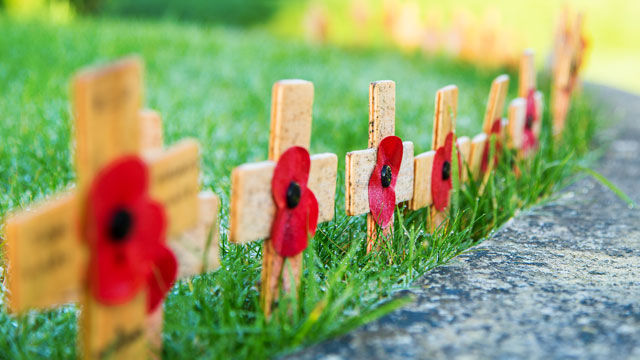
Remembrance Day 2020: why it’s more relevant than ever this year
“The first stroke of eleven produced a magical effect.
“The tram cars glided into stillness, motors ceased to cough and fume, and stopped dead, and the mighty-limbed dray horses hunched back upon their loads and stopped also, seeming to do it of their own volition.
“Someone took off his hat, and with a nervous hesitancy the rest of the men bowed their heads also. Here and there an old soldier could be detected slipping unconsciously into the posture of ‘attention’. An elderly woman, not far away, wiped her eyes, and the man beside her looked white and stern. Everyone stood very still … The hush deepened. It had spread over the whole city and become so pronounced as to impress one with a sense of audibility. It was a silence which was almost pain … And the spirit of memory brooded over it all.”
– Manchester Guardian, reporting on the first two-minute silence held in London on 11 November 1919
From a young age I knew what Remembrance Day was. As well as marking the end of the First World War, it’s a chance for us to take the time to honour, remember and thank those who lost their lives and made sacrifices in order for us to have the future, lives and experiences we’re lucky enough to have today.
It may be down to the current circumstances (and having more time on my hands than usual) that’s made me really stop and think this year about Remembrance Day. How its meaning has evolved since I was a child. And how, as my daughter grows up, it will continue to change and evolve.
At its core, Remembrance Day still honours all those who fought in the First World War, but we now recognise all those that serve in the armed forces and have fought in conflicts near and far, both geographically and periodically. The way in which we choose to remember, honour, thank or commemorate has also branched out from the traditional two minute silence, – the first of which occurred 101 years ago and still continues today, to wearing poppies, donating to charity, and embarking on emotional history trips to the very places these tragedies occurred.
Honouring today’s heroes
Most recently as a nation we’ve realised that a war is not just a physical battle and that a pandemic can claim lives, change futures and needs heroes to make sacrifices to protect us. Those heroes have been remembered and thanked with cheers, clapping and rainbow signs in windows, and wear a variety of different uniforms.
They’re the delivery drivers making sure those shielding are able to receive food and medication. The refuse collectors keeping the streets clean and the bins emptied. The supermarket staff whose jobs now also include managing queues outside shops and making sure people are social distancing. And of course, the healthcare professionals who work 12-hour shifts in PPE whilst continuing to care for those who need them now more than ever.
The phrase “lest we forget” is synonymous with Remembrance Day, and the task of making sure future generations understand why it’s important to honour past and present heroes is one that parents and teachers have taken on year after year as 11th November rolls around.
In previous years a trip to the battlefields to see first-hand the sites where soldiers fought and died for our freedom was a great way to do this. However, with the travel restrictions currently in place, we have to think of new ways of bringing Remembrance Day and everything it represents to the classroom.
– Lucy Simson, Educational Tours Sales Manager
Useful teaching resources for Remembrance Day
The Royal British Legion
Perfect for: KS1-KS4
The Royal British Legion has some great teacher resources for different ages from KS1 to KS4 which can work for remote learning, as well as classroom-based learning. It also branches out to include the modern day heroes who are keeping us safe during the Coronavirus pandemic.
The British Red Cross
Perfect for: Ages 11-16
The British Red Cross resources focus on the importance of remembering and the qualities shown in the volunteers who helped in the war effort. They also encourage self-reflection from students to think about which of these qualities they also have.
TES
Perfect for: KS1-KS2
For classic Remembrance Day lesson plans and resources, then TES.com has everything you need to support KS1 and KS2 learning.
Now more than ever we must remember, we must give thanks and we must make sure that we continue to honour our heroes past, present and future.
